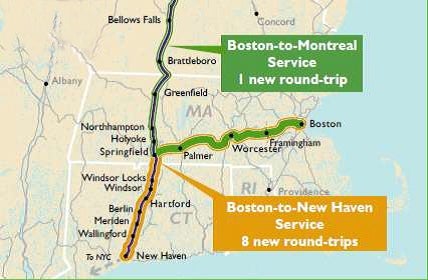A proposed rail program that would add two new routes connecting Boston to both New Haven and Montreal through Worcester could bring more than $1.2 billion in infrastructure improvements to the Northeast.
The Northern New England Intercity Rail Initiative study, which examined high-speed rail in the Northeast, proposes to restore service between Boston and New Haven through Springfield and Hartford and add new service between Boston and Montreal. On Wednesday it received clearance from the Federal Railroad Administration for states and the federal government to invest in these rail services.
“Existing passenger rail service through New England is limited and already at capacity for a region that is growing,” U.S. Transportation Secretary Anthony Foxx said in a statement. “With an approved blueprint in hand, New England can now move forward to connect people to key job centers and allow students to easily travel to and from New England’s numerous colleges.”
The study projects eight daily, round-trip departures connecting New Haven and Boston, one new round-trip connecting Boston and Montreal and one new round-trip connecting New Haven and Montreal.
All of these new routes would move increased rail traffic through Worcester and call for improvements to Massachusetts’ rail infrastructure to the tune of $273 million to $309 million, according to information provided by the Office of Congressman Richard Neal (D).
These improvements would include a second track running between Worcester and Springfield, as well as an additional platform at Worcester’s Union Station.
The study was developed jointly between the Massachusetts Department of Transportation and the Vermont Agency for Transportation with support from the Federal Railroad Administration. The study envisions the build-out of these proposals happening within the next 20 years.

